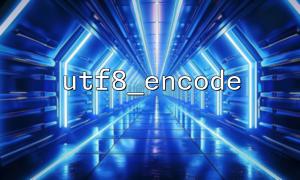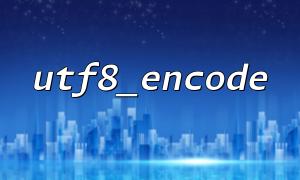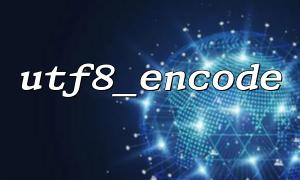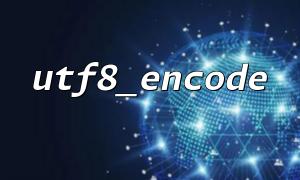<span><span><span class="hljs-meta"><?php</span></span><span>
</span><span><span class="hljs-comment">// This part of the code is unrelated to the article, only for example purposes</span></span><span>
</span><span><span class="hljs-function"><span class="hljs-keyword">function</span></span></span><span> </span><span><span class="hljs-title">exampleFunction</span></span><span>(</span><span><span class="hljs-params"></span></span><span>) {
</span><span><span class="hljs-keyword">return</span></span><span> </span><span><span class="hljs-string">"Example function, not related to the article content."</span></span><span>;
}
</span><span><span class="hljs-keyword">echo</span></span><span> </span><span><span class="hljs-title function_ invoke__">exampleFunction</span></span><span>();
</span><span><span class="hljs-meta">?></span></span><span>
<p><hr></p>
<p>What’s the Difference Between utf8_encode and mb_convert_encoding? How to Choose the Right Encoding Conversion Function?</p>
<p>When handling character encoding conversion in PHP, utf8_encode and mb_convert_encoding are two commonly used functions, but they have distinct features and different use cases. Understanding their differences helps you choose the right method for your project’s needs.</p>
<h3>1. Introduction to utf8_encode</h3>
<p>utf8_encode is a simple built-in PHP function used to convert strings from ISO-</span>8859-1 (Latin-1) encoding to UTF-8. Example usage:</p>
</span></span>Advantages:
Disadvantages:
### 2. Introduction to mb_convert_encoding
mb_convert_encoding is a powerful function provided by the multibyte string (mbstring) extension, supporting conversion between multiple encodings. Example usage:
<span><span><span class="hljs-variable">$converted</span></span><span> = </span><span><span class="hljs-title function_ invoke__">mb_convert_encoding</span></span><span>(</span><span><span class="hljs-variable">$string</span></span><span>, </span><span><span class="hljs-string">'UTF-8'</span></span><span>, </span><span><span class="hljs-string">'GBK'</span></span><span>);
</span></span>Parameter explanation:
Advantages:
Disadvantages:
### 3. How to Choose the Right Function?
### 4. Summary
| Function | Supported Encodings | Use Case | Dependency |
|---|---|---|---|
| utf8_encode | ISO-8859-1 → UTF-8 | Simple one-way conversion | None |
| mb_convert_encoding | Multiple encodings | Complex, multilingual, multi-encoding environments | Requires mbstring extension |
In short, utf8_encode is a quick but limited solution; mb_convert_encoding is more powerful, flexible, and suitable for broader use cases.
By understanding their differences and use cases, developers can choose the right encoding conversion function to ensure proper character handling and stable application performance.
<span></span>




